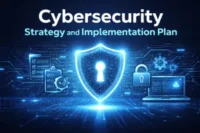Why Cybersecurity is Critical for Every Business: Real Risks, Costs, and Solutions
Published: 7 Nov 2025
The importance of cybersecurity for business cannot be ignored. Studies show that over 70% of cyberattacks target small and medium-sized enterprises, resulting in millions of dollars in yearly financial losses.
What is cybersecurity? Cybersecurity refers to protecting your business from cyberattacks and other security risks. It helps protect your important information, like customer data and financial details, from hackers.
Big or small businesses must prioritize data security and protect sensitive information. A robust cybersecurity strategy helps protect customer information and prevent costly financial losses.
Table of Contents
Why Cybersecurity is Important For Business?: The Real Risks Businesses Face
Cyber threats are real and growing. Businesses are targeted daily by cyberattacks that aim to steal sensitive data or disrupt systems.
One common threat is a data breach, where hackers break into your systems and steal customer or financial information. Malware is another danger. It’s harmful software that can slow down or damage your computer without your knowledge.
There are also risks associated with party vendors outside companies that provide services such as payments or file storage. If their systems aren’t secure, your business data could be exposed.
And don’t forget about phishing emails. These fake messages trick people into clicking dangerous links or sharing private information. One wrong click can give a hacker full access to your business accounts.
The Real Costs of Security Breaches

A cyberattack can do more than steal data; it can cost you a significant amount of money. Some businesses lose thousands due to theft or system downtime when they can’t operate.
It also disrupts your daily operations. You may have to stop services, delay projects, or rebuild your systems from scratch.
Worse, a breach can lead to a loss of customer trust. People want to feel secure when using your service. If their info gets leaked, they might not come back.
Why Small and Medium Businesses Are at Risk
Many people think only big companies get hacked, but that’s not true. Hackers often target small and medium-sized businesses because they usually have weaker security systems.
Smaller companies often don’t have the budget for full-time IT teams or advanced tools. They lack key protections, such as a strong incident response plan or multi-factor authentication (MFA). These two simple measures can prevent many attacks.
A small online store used the same weak password for all systems. One hacker got in and accessed customer payment details. It took months to fix the damage and regain trust.
How Cybersecurity Helps Protect Your Business
The good news? Cybersecurity doesn’t just stop threats; it helps your business grow stronger.
First, it protects sensitive data, such as customer information, bank details, and business plans. Keeping that information safe means keeping your business secure.
Second, cybersecurity improves your overall security posture. That means you’re better prepared to handle problems. Tools like multi-factor authentication make it much harder for hackers to break in.
Finally, it helps your business run smoothly. When your systems are secure, you won’t face sudden shutdowns or panic after a breach. You stay focused on your work, not on fixing problems.
Easy Cybersecurity Tips for Beginners
You don’t need to be a tech expert to protect your business. Start with these simple steps:
A. Conduct Regular Risk Assessments
This helps you find weak points before hackers do. It’s like checking the locks on your doors.
B. Use Multi-Factor Authentication (MFA)
Passwords alone aren’t enough. MFA adds a second step like a code sent to your phone to keep accounts safer.
C. Train Your Team on Information Security
Many attacks happen because someone clicks the wrong link. Teach your team how to spot fake emails and report anything suspicious.
D. Have an Incident Response Plan Ready
If something goes wrong, you need to act fast. A plan tells your team exactly what to do in case of a cyber attack.
| cautious |
|---|
Avoid common mistakes such as ignoring software updates, using weak passwords, or skipping employee training. These minor oversights can create significant risks. Stay vigilant and proactive to keep your business secure. |
Conclusion
In this article, we’ve covered the importance of cybersecurity for businesses in detail. From my experience, the best way to protect your company is to start with easy yet powerful steps, such as conducting regular risk assessments, utilizing multi-factor authentication, and training your team to identify cyber threats. These simple cybersecurity measures can strengthen your security posture and prevent costly data breaches. Don’t wait for a security breach; start building your cybersecurity strategy today to keep your business, customer information, and operations safe.
Remember, the importance of cybersecurity for business goes beyond just technology; it’s about protecting your hard work and your customers’ trust. Keep learning and exploring this topic to stay one step ahead of cyber threats.
FAQs
What is cyber security for business?
Cybersecurity for business is the practice of protecting a company’s data, networks, and systems from digital attacks. It involves using tools and policies to prevent unauthorized access, detect threats, and respond to security incidents. Effective business cybersecurity includes firewalls, data encryption, employee training, and regular system updates to keep sensitive information safe and maintain customer trust.
Does a small business need cyber security?
Yes, small businesses need cybersecurity. Hackers often target small companies because they usually have weaker security systems. A single attack can lead to data loss, financial damage, or loss of customer trust. Protecting your business with strong passwords, updated software, data backups, and employee training can prevent most common threats and keep your information safe.
How do I know if my business is at risk of a cyber attack?
Your business is at risk of a cyberattack if it handles sensitive data, uses outdated software, or lacks strong security controls. Watch for signs like unusual network activity, suspicious emails, or unauthorized logins. Any company that operates online can be a target. Conduct regular security checks, update your systems, and train employees to spot threats and keep your data safe.
What are the most common cyber threats to businesses?
The most common cyber threats to businesses include phishing attacks, malware, ransomware, and data breaches. Phishing tricks employees into sharing sensitive information. Malware and ransomware can steal or lock your data. Weak passwords and unsecured networks also create risks. Businesses should use strong passwords, multi-factor authentication, and regular system updates to prevent these threats.
How can I protect my business with simple cybersecurity measures?
You can protect your business with simple cybersecurity measures by following basic best practices. Use strong, unique passwords and enable multi-factor authentication on all accounts. Keep your software and systems updated to fix security flaws. Back up important data regularly and store copies safely. Train employees to spot phishing emails and avoid suspicious links. Install reliable antivirus software and use secure Wi-Fi networks. These simple steps can greatly reduce your risk of a cyberattack.
What is multi-factor authentication, and should I use it?
Multi-factor authentication (MFA) adds an extra layer of security by requiring more than one way to verify your identity when logging in. For example, you might enter your password and then confirm a code sent to your phone or email. Yes, you should use MFA on all important accounts. It makes it much harder for hackers to access your systems, even if they steal your password.

- Be Respectful
- Stay Relevant
- Stay Positive
- True Feedback
- Encourage Discussion
- Avoid Spamming
- No Fake News
- Don't Copy-Paste
- No Personal Attacks

- Be Respectful
- Stay Relevant
- Stay Positive
- True Feedback
- Encourage Discussion
- Avoid Spamming
- No Fake News
- Don't Copy-Paste
- No Personal Attacks






